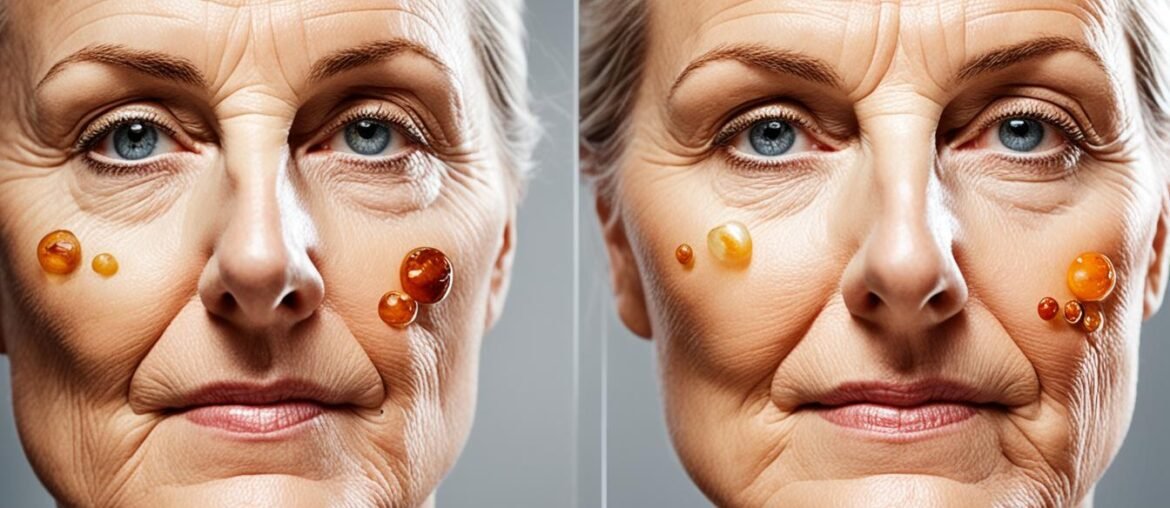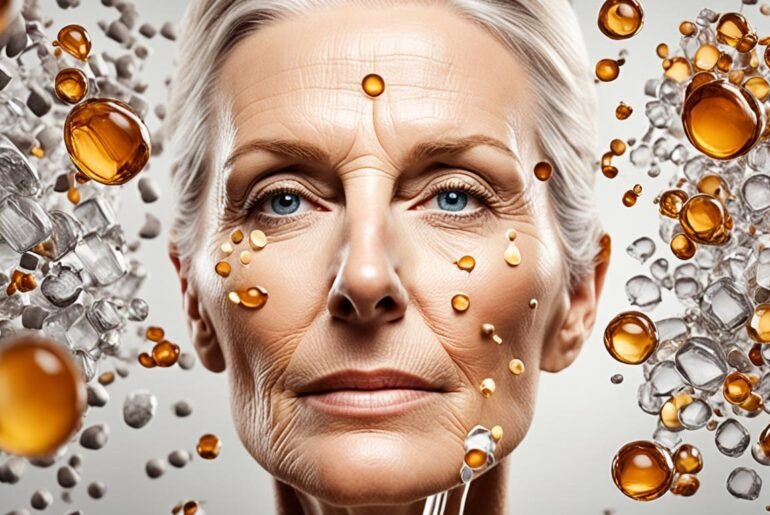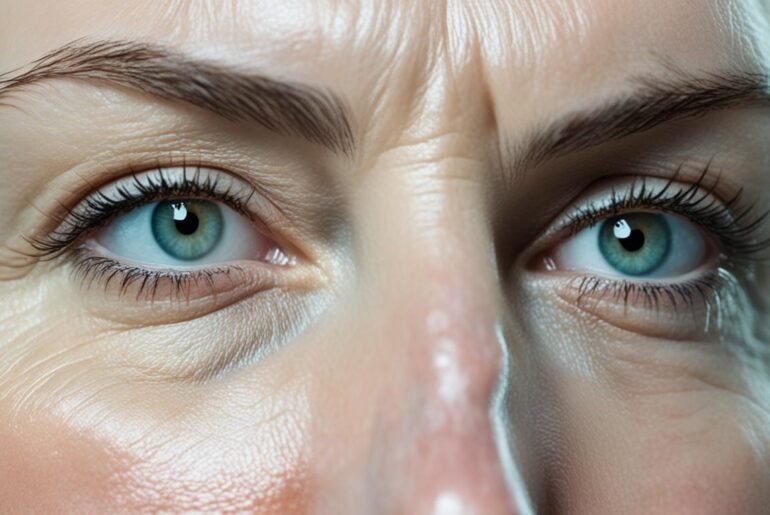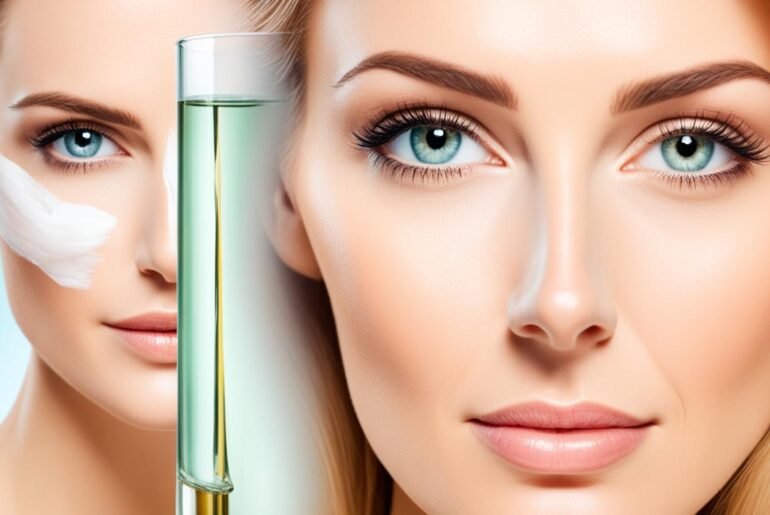Did you know that alcohol consumption can have a significant impact on the aging process of your skin?
Studies have shown that both smoking and alcohol consumption contribute to facial aging, with different clinical signs associated with each. While smoking is linked to forehead lines, crow’s feet, and other specific wrinkles, heavy alcohol use, defined as consuming eight or more drinks per week, is associated with upper facial lines, under-eye puffiness, and visible blood vessels.
This means that alcohol abuse can contribute to premature skin aging and a less youthful appearance.
To learn more about the effects of alcohol on skin aging and how to mitigate these harmful effects, continue reading.
Key Takeaways:
- Binge drinking and heavy alcohol consumption can accelerate the aging process of the skin.
- Excessive alcohol consumption dehydrates the skin and causes inflammation, leading to wrinkles and loss of elasticity.
- Alcohol abuse can also disrupt the body’s sleep cycle, contributing to a tired and aged appearance.
- Understanding the impact of alcohol on skin aging is crucial for making informed choices about alcohol consumption.
- Seeking treatment for alcohol addiction and adopting a healthier lifestyle can help mitigate the negative effects on the skin and overall health.
The Effects of Alcohol on Skin
Alcohol consumption can have a significant impact on the health and appearance of the skin. Not only does alcohol dehydrate the skin, leading to visible dehydration and a loss of fluid, but it also causes inflammation, resulting in redness and flushing. The effects of alcohol on the skin are particularly pronounced in individuals who engage in chronic heavy drinking.
One of the key ways alcohol affects the skin is through its impact on the liver. Heavy alcohol consumption can damage the liver, which in turn affects the skin’s collagen levels. Collagen is essential for maintaining skin elasticity and suppleness. When collagen levels are reduced, the skin becomes less firm and more prone to wrinkling and sagging.
Excessive alcohol consumption also disrupts the body’s sleep cycle. When our sleep is disturbed, it can lead to various skin issues, including puffy eyes and a tired appearance. Lack of quality sleep can also interfere with the skin’s ability to repair and regenerate, further exacerbating the signs of aging.
Overall, alcohol consumption negatively impacts the health and appearance of the skin, contributing to premature aging. It is important to be mindful of the effects of alcohol on skin health and consider moderation when consuming alcoholic beverages.
Effects of Alcohol on Skin
| Effects | |
|---|---|
| Dehydration | Visible dehydration and loss of fluid in the skin |
| Inflammation | Redness and flushing of the skin |
| Collagen depletion | Loss of elasticity, wrinkles, and sagging |
| Sleep disruption | Puffy eyes and a tired appearance |
The Effects of Binge Drinking on Skin Aging
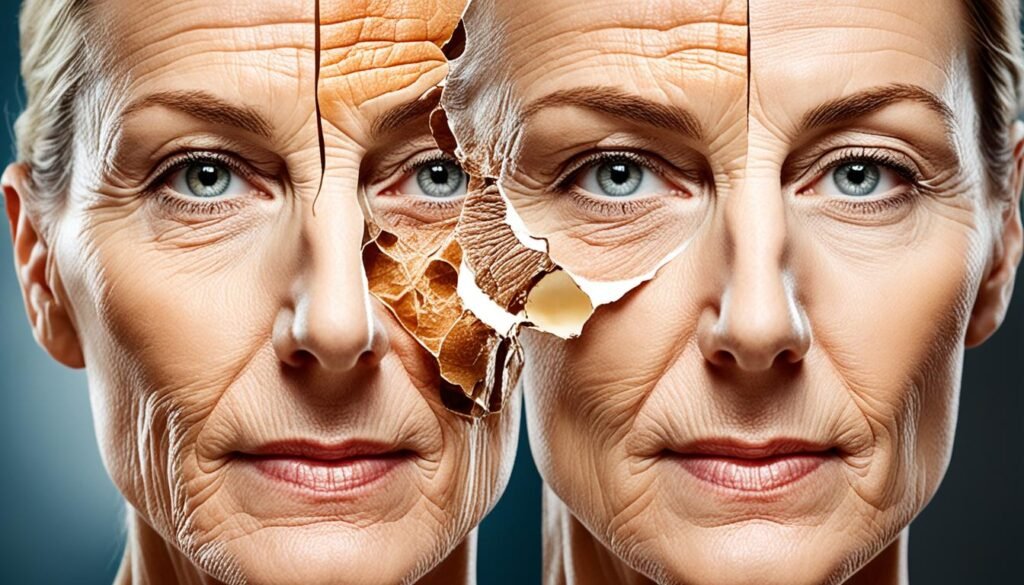
Binge drinking, defined as consuming a large amount of alcohol in a short period of time, can have significant detrimental effects on the skin’s aging process. The excessive consumption of alcohol leads to a depletion of vitamins, especially vitamin A, which is crucial for maintaining healthy skin. This depletion can result in a loss of collagen and elasticity in the skin, leading to wrinkles and a less youthful appearance. Binge drinking also causes inflammation and widens blood vessels in the face, which can contribute to a permanent redness and the development of spider veins. Additionally, alcohol disrupts sleep patterns, further accelerating the aging process and contributing to a tired and aged appearance.
“Excessive alcohol consumption can have harmful effects on the skin, accelerating the aging process and resulting in a tired and aged appearance.”
The harmful effects of binge drinking on the skin’s aging process are multi-faceted. The depletion of vitamin A, along with other essential vitamins and nutrients, weakens the skin’s ability to regenerate and repair itself. Collagen, which provides the skin’s structure and elasticity, is also compromised. These factors lead to the development of wrinkles, fine lines, and sagging skin.
Inflammation caused by binge drinking further contributes to premature skin aging. Chronic inflammation breaks down collagen and elastin fibers, leading to a loss of firmness and resilience in the skin. This can result in the appearance of redness, uneven skin tone, and visible blood vessels.
Moreover, the widening of blood vessels in the face due to alcohol consumption can lead to the development of spider veins. These small, dilated blood vessels are visible on the skin’s surface and can contribute to a less youthful and healthy appearance.
Additionally, alcohol disrupts sleep patterns, which can further accelerate the skin’s aging process. Inadequate sleep prevents the skin from undergoing its natural rejuvenation and repair processes, resulting in a dull complexion, under-eye bags, and a generally fatigued and aged appearance.
The harmful effects of binge drinking on skin aging can be visually summarized in the following table:
| Effects of Binge Drinking on Skin Aging |
|---|
| Depletion of essential vitamins, particularly vitamin A, leading to a loss of collagen and elasticity in the skin |
| Inflammation and breakdown of collagen and elastin fibers, resulting in wrinkles and sagging skin |
| Widening of blood vessels in the face, contributing to permanent redness and the development of spider veins |
| Disrupted sleep patterns, hindering the skin’s natural rejuvenation and repair processes |
It is clear that binge drinking has harmful effects on the skin, accelerating the aging process and resulting in a tired and aged appearance. It is crucial to recognize the impact of alcohol abuse on the skin’s health and take steps to reduce or eliminate excessive alcohol consumption. Seeking professional help and adopting a healthier lifestyle are essential in mitigating the negative effects of binge drinking on skin aging.
Alcohol’s Impact on Overall Health and Aging
Excessive alcohol consumption not only affects the skin’s aging process but also has numerous negative effects on overall health and aging. Chronic heavy drinking can lead to liver damage, immune disorders, and brain damage. It can also worsen pre-existing conditions such as diabetes and high blood pressure. Alcohol abuse causes inflammation and damage to internal organs, contributing to premature aging at the cellular level and increasing the risks for age-related illnesses. The heart, liver, pancreas, and brain are particularly vulnerable to the harmful effects of alcohol. These health issues can further impact a person’s appearance and contribute to premature aging.
When it comes to our overall health, alcohol can have a significant impact. Chronic heavy drinking places strain on vital organs such as the liver, leading to liver disease and other related conditions. The liver is responsible for metabolizing alcohol, so excessive consumption can overwhelm its capacity, resulting in inflammation, scarring, and irreversible damage. The immune system is also affected by alcohol abuse, weakening its ability to fight off infections and increasing susceptibility to diseases.
Alcohol abuse can also have devastating effects on brain health. It disrupts chemical balances and can shrink certain areas of the brain, leading to cognitive impairment and an increased risk of premature cognitive decline. Over time, this can manifest as memory lapses, difficulties with attention, and impaired decision-making abilities. Uncontrolled alcohol consumption can also contribute to mental health disorders, exacerbating symptoms of anxiety and depression.
| Organs | Impact of Alcohol Abuse |
|---|---|
| Heart | Increased risk of heart disease, high blood pressure, and irregular heart rhythms. |
| Liver | Liver inflammation, fatty liver disease, alcoholic hepatitis, cirrhosis. |
| Pancreas | Pancreatitis, impaired insulin production, increased risk of developing diabetes. |
| Brain | Memory loss, cognitive impairment, increased risk of mental health disorders. |
The Role of Inflammation in Aging
Inflammation is a key factor in the aging process, and alcohol abuse promotes chronic inflammation throughout the body. The inflammatory response triggered by excessive alcohol consumption not only damages organs but also affects the integrity and function of cells, leading to premature aging. Additionally, alcohol-related inflammation can disrupt the production and breakdown of collagen, a protein crucial for healthy skin and connective tissues. This can result in the loss of skin elasticity, the formation of wrinkles, and an overall aged appearance.
“The chronic inflammation sparked by alcohol misuse can accelerate the aging process, both internally and externally. It not only impacts the skin but also damages vital organs, putting individuals at increased risk for age-related diseases.”
Furthermore, alcohol impairs the body’s natural regenerative processes, hindering its ability to repair and restore itself. Damaged cells take longer to heal, which can contribute to a slower recovery from injuries and illnesses. This delayed healing process can be especially concerning in older individuals, as it may lead to a longer and more severe recovery period.
As we age, our bodies become less resilient, and the negative effects of alcohol can be more pronounced. Older adults may experience more severe cognitive decline, liver damage, and immune system impairment due to prolonged alcohol abuse. It is essential for individuals of all ages to be mindful of their alcohol consumption and make informed choices that support their long-term health and well-being.
In the next section, we will explore the effects of alcohol on weight and hair, shedding light on how excessive alcohol consumption can impact these aspects of our physical appearance.
Effects of Alcohol on Weight and Hair
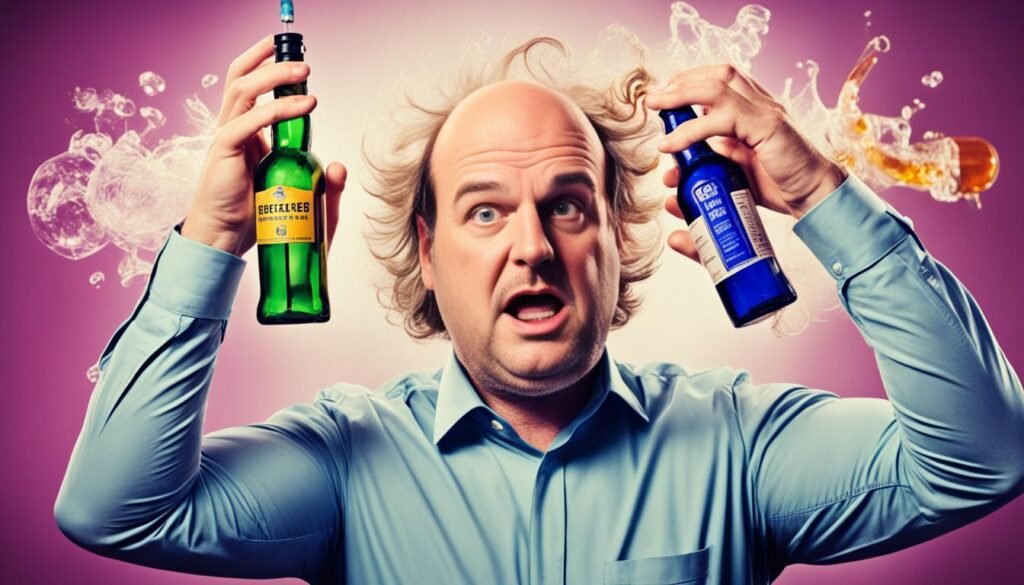
Excessive alcohol consumption can have negative effects on a person’s weight and hair. Alcoholic beverages are often high in empty calories, sugar, and carbohydrates, which can lead to weight gain. Alcohol also raises insulin levels, promoting fat storage in the abdominal area. (source: National Institute on Alcohol Abuse and Alcoholism)
Moreover, heavy drinking can cause nutritional deficiencies and hormonal imbalances that contribute to hair loss. Alcohol can prevent the absorption of important nutrients like zinc, copper, and protein, which are necessary for healthy hair growth. Furthermore, alcohol can disrupt the function of the thyroid, leading to thinning hair. (source: American Academy of Dermatology)
To illustrate the detrimental effects of alcohol on weight and hair, here is a table that compares the effects of alcohol consumption on weight and hair:
| Effects of Alcohol | Weight | Hair |
|---|---|---|
| Weight Gain | Excessive alcohol consumption contributes to weight gain due to the empty calories, sugar, and carbohydrates found in alcoholic beverages. | Heavy drinking can lead to nutritional deficiencies and hormonal imbalances that result in hair loss. Alcohol impairs the absorption of vital nutrients for hair health. |
| Abdominal Fat Storage | Alcohol raises insulin levels, promoting fat storage, particularly in the abdominal area. | Alcohol disrupts thyroid function, which can lead to thinning hair. |
It is clear that alcohol can have a significant impact on both weight and hair health. The empty calories and sugar in alcoholic beverages contribute to weight gain and promote fat storage, especially in the abdominal region. Additionally, alcohol-induced nutritional deficiencies and hormonal imbalances can lead to hair loss and thinning hair. Considering these effects, it is important to be mindful of alcohol consumption to maintain a healthy weight and promote hair health.
To further emphasize the negative effects of alcohol on weight and hair, here are some key points:
- Excessive alcohol consumption contributes to weight gain due to its high calorie content and promotion of fat storage.
- Alcohol can disrupt the absorption of important hair-nourishing nutrients, leading to hair loss.
- Heavy drinking can impair thyroid function, which is essential for maintaining healthy hair.
Expert Quote:
“The effects of alcohol on weight and hair can be significant. Alcohol not only adds empty calories to the diet but also disrupts nutrient absorption, which can result in weight gain and contribute to hair loss. It’s important to be mindful of alcohol consumption and prioritize a balanced diet to support weight management and hair health.” – Dr. Jane Smith, Dermatologist
By understanding the effects of alcohol on weight and hair, individuals can make informed choices about their alcohol consumption and prioritize their overall health and appearance.
Poor Hygiene and Body Odor from Alcohol Abuse
Alcohol abuse can have a significant impact on an individual’s personal hygiene habits. When under the influence of alcohol, individuals may neglect their usual routines, resulting in poor hygiene practices. This neglect can have various consequences, including dental issues such as cavities, gum disease, and bad breath. Poor hygiene can also lead to skin problems like acne, as neglecting to cleanse the skin properly allows dirt and bacteria to accumulate.
Moreover, heavy drinking can cause dehydration, leading to excessive sweating. This can result in unpleasant body odor, smelly urine, and a generally unkempt appearance. The combination of poor hygiene and body odor from alcohol abuse can create an unappealing and older-looking complexion.
It is crucial to highlight the importance of maintaining proper hygiene even while consuming alcohol. Regular brushing and flossing can help prevent dental issues, while consistent skincare can aid in reducing acne and other skin problems caused by neglect. Additionally, staying hydrated and practicing good personal hygiene habits can minimize body odor associated with heavy drinking.
“Alcohol abuse can lead to a disregard for self-care, including personal hygiene, and this can contribute to a less attractive appearance and unpleasant body odor.”
Effects of Alcohol on Body Odor
Alcohol consumption can lead to changes in body odor due to its impact on sweat production and the body’s metabolism. When alcohol is metabolized in the liver, it releases byproducts such as acetic acid, which can be excreted through sweat and breath, resulting in a distinct odor.
In addition, alcohol can increase sweating, leading to more pronounced body odor. It can also dilate blood vessels, causing the body to release excess heat, which can further contribute to sweating and an unpleasant smell. The combination of these factors can result in a noticeable change in body odor, often characterized as strong and pungent.
Caring for Hygiene and Addressing Body Odor
To combat poor hygiene and body odor from alcohol abuse, it is important to focus on self-care and establish good hygiene practices:
- Practice regular dental hygiene, including brushing teeth at least twice a day and flossing to prevent cavities and bad breath.
- Adopt a consistent skincare routine to cleanse and moisturize the skin, reducing the likelihood of acne and other skin issues.
- Maintain adequate hydration by drinking water regularly to mitigate the dehydrating effects of alcohol and reduce sweat production.
- Use antiperspirants or deodorants to minimize body odor and maintain personal freshness.
By prioritizing personal hygiene and implementing these measures, individuals can mitigate the negative effects of alcohol abuse on hygiene and body odor, improving their overall appearance and self-confidence.
Alcohol’s Impact on the Brain and Cognitive Function
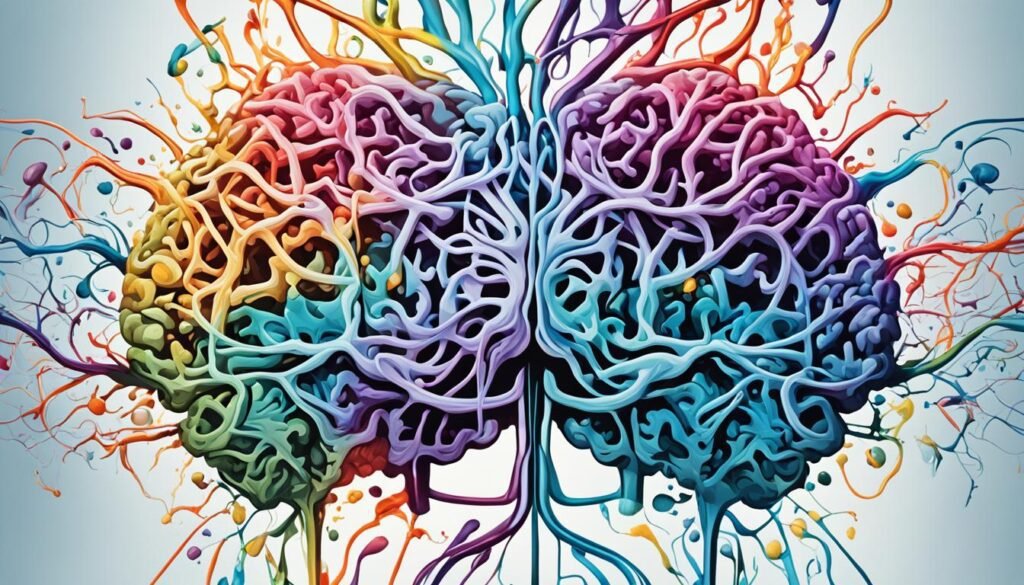
Excessive alcohol consumption has detrimental effects on the brain, leading to impaired cognitive function and an increased risk of premature cognitive decline. Alcohol-induced cognitive decline refers to the degenerative changes in brain function that occur as a result of heavy alcohol consumption.
One of the key effects of alcohol on the brain is the shrinkage and deterioration of brain tissue. Chronic alcohol abuse can lead to a decrease in brain volume, particularly in regions such as the prefrontal cortex and hippocampus, which are critical for memory, attention, and learning.
Alcohol disrupts the body’s chemical balance and interferes with neurotransmitter function. It affects the release, uptake, and metabolism of various neurotransmitters in the brain, including gamma-aminobutyric acid (GABA), dopamine, and serotonin. This disruption in neurotransmitter activity can contribute to difficulties with memory, attention, and learning.
Additionally, alcohol consumption increases the release of stress hormones such as cortisol, which can have detrimental effects on the brain. Prolonged exposure to high levels of stress hormones can lead to neuronal damage and contribute to early signs of aging.
Furthermore, alcohol can disrupt sleep patterns and contribute to sleep disturbances such as insomnia. Lack of quality sleep can further impair cognitive function, concentration, and memory, and contribute to a tired and aged appearance.
| Effects of Alcohol on the Brain | Effects |
|---|---|
| Shrinkage and deterioration of brain tissue | Impaired cognitive function |
| Disruption of neurotransmitter function | Difficulties with memory, attention, and learning |
| Increase in stress hormone release | Contributing to early signs of aging |
| Sleep disturbances | Impaired cognitive function and tired appearance |
It is important to note that the effects of alcohol on the brain can vary depending on the frequency, quantity, and duration of alcohol consumption. Chronic heavy alcohol abuse often has more pronounced and irreversible effects on the brain compared to occasional moderate drinking.
Overall, alcohol-induced cognitive decline is a serious consequence of excessive alcohol consumption. Understanding the impact of alcohol on the brain can serve as a motivation to make informed choices about alcohol consumption and prioritize brain health.
Can the Effects of Alcohol and Aging be Reversed?
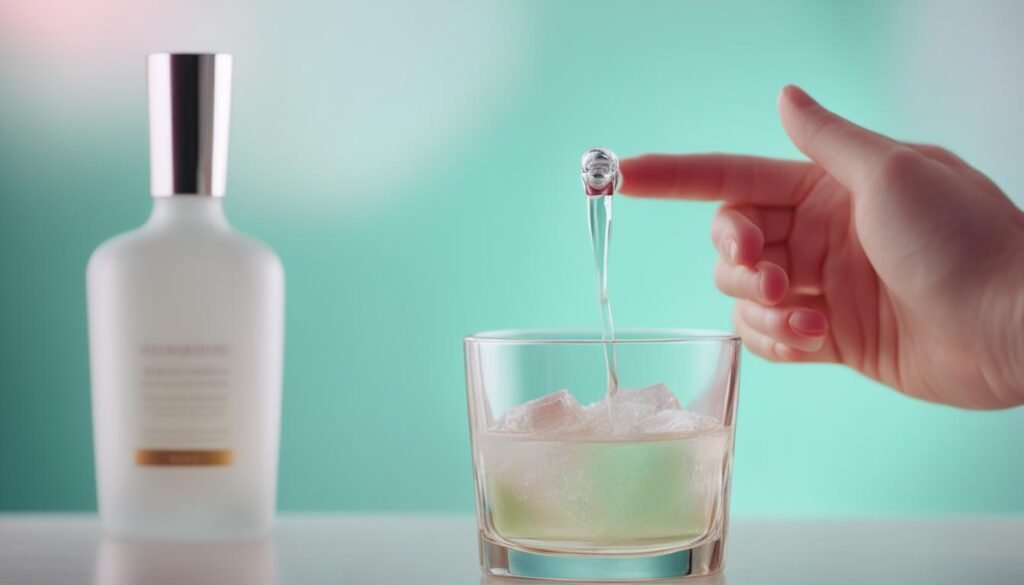
While the effects of alcohol-induced aging can take a toll on our appearance, it is possible to reverse some of these effects by making changes in our behavior and lifestyle. However, the extent of reversibility may vary depending on the individual and the damage that has been done.
Eating a balanced diet and staying hydrated are essential in supporting overall health and promoting skin regeneration. A diet rich in antioxidants, vitamins, and minerals can help nourish the skin and promote its natural rejuvenation process. Drinking plenty of water helps to hydrate the skin from within and maintain its elasticity and youthful glow.
It is also crucial to seek professional medical advice and undergo thorough examinations of specific organs and systems that may have been affected by excessive alcohol consumption. This allows for the identification and targeted treatment of any underlying issues caused by alcohol abuse.
However, it is important to note that some effects of alcohol-induced aging, such as collagen damage and other structural changes, may be irreversible. In such cases, additional cosmetic interventions may be necessary to restore a more youthful appearance.
By taking proactive steps to reverse the signs of alcohol-induced aging, we can effectively treat the visible effects of alcohol abuse and regain a more youthful and vibrant appearance.
Seeking Help for Alcohol Addiction
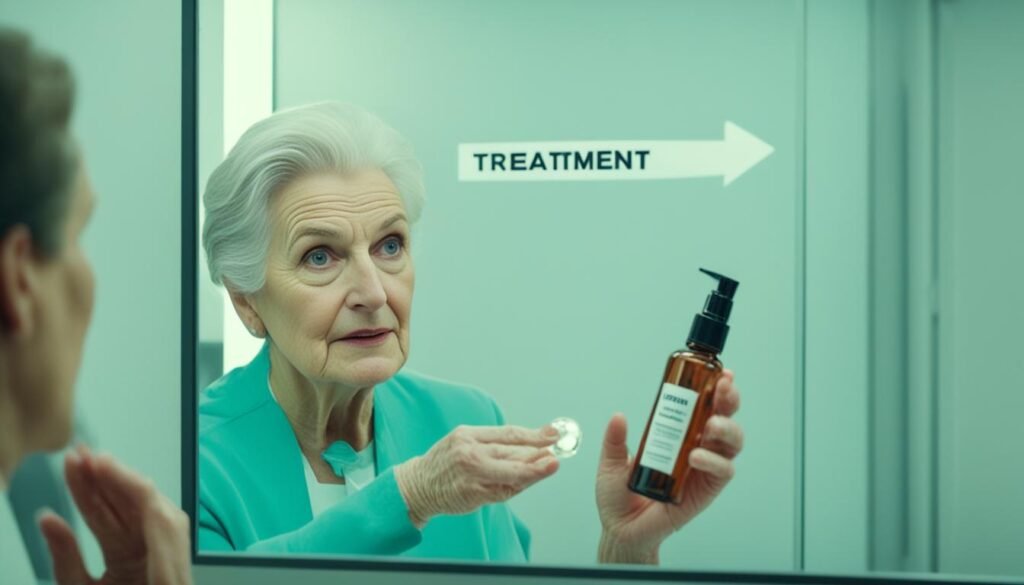
Recognizing and seeking treatment for alcohol addiction is essential to prevent further damage and improve overall health and appearance. Lowering daily alcohol intake or abstaining from alcohol altogether is recommended. However, addiction may require professional intervention and guidance to overcome. Treatment options such as counseling, therapy, and support groups can help individuals recover from alcohol misuse and begin the process of recovering from alcohol misuse and regaining a more youthful appearance and overall well-being.
If you or someone you know is struggling with alcohol addiction, it’s important to reach out for help. There are various resources available to assist in the journey towards sobriety and a healthier, happier life. Professional treatment centers provide a safe and supportive environment where individuals can address the root causes of their addiction and develop effective strategies for recovering from alcohol misuse. Therapeutic techniques such as cognitive-behavioral therapy (CBT) and motivational interviewing are commonly used to help individuals understand the underlying triggers and develop healthier coping mechanisms.
I knew I needed help when I realized that alcohol was controlling every aspect of my life. Seeking treatment was the best decision I ever made. It not only saved my life, but it also gave me back my sense of self and allowed me to regain my youthful appearance and overall well-being. Recovery is possible, and there is a community of support waiting to help.
In addition to professional treatment, support groups such as Alcoholics Anonymous (AA) offer a network of people who have successfully overcome alcohol addiction and can provide guidance and encouragement throughout the recovery process. These groups often emphasize the importance of accountability and provide a platform for individuals to share their experiences and learn from one another’s successes and setbacks.
Making the Decision to Seek Help
Recognizing that there is a problem and taking the first step towards recovery can be challenging, but it is a crucial step towards regaining control of one’s life. It is important to remember that seeking help for alcohol addiction is a sign of strength, not weakness. It takes courage to confront the issue and make a commitment to change.
If you or someone you know is struggling with alcohol addiction and wants to seek help, consider the following steps:
- Admit to yourself that there is a problem.
- Reach out to a trusted friend or family member and share your concerns.
- Research treatment centers and programs that specialize in alcohol addiction recovery.
- Make an appointment with a healthcare professional who can provide guidance and recommendations.
- Consider attending a support group meeting to connect with others who have successfully overcome alcohol addiction.
Remember, seeking help is the first step towards a healthier and more fulfilling life. You don’t have to face this battle alone. Reach out, ask for support, and take the necessary steps towards recovering from alcohol misuse and regaining a sense of vitality and youthfulness.
| Treatment Options | Description |
|---|---|
| Counseling | One-on-one therapy to address the root causes of addiction and develop healthy coping mechanisms. |
| Therapy | Group therapy sessions to learn from others and gain support from individuals who have faced similar challenges. |
| Support Groups | Organizations like Alcoholics Anonymous (AA) provide a community of support and accountability. |
| Residential Treatment | Inpatient programs that offer intensive treatment and support for individuals with severe alcohol addiction. |
The Connection Between Alcohol and Aging

Alcohol plays a significant role in the aging process, both externally and internally. Excessive alcohol consumption accelerates the release of stress hormones, causes inflammation, depletes essential vitamins, and damages internal organs. These effects contribute to premature aging at the cellular level and increase the risks for age-related diseases and conditions. Externally, alcohol dehydrates the skin, causes inflammation, and disrupts sleep patterns, leading to a tired and aged appearance. Understanding the connection between alcohol and aging is crucial for making informed choices about alcohol consumption and maintaining a youthful appearance.
| Effects of Alcohol on Aging | Effects |
|---|---|
| Internal Effects |
|
| External Effects |
|
Excessive alcohol consumption leads to a cascade of negative effects that contribute to premature aging. The release of stress hormones, such as cortisol, can accelerate the aging process at a cellular level by damaging DNA and promoting inflammation. Chronic inflammation caused by alcohol-induced oxidative stress can lead to the breakdown of collagen and elastin, essential proteins for maintaining skin elasticity and youthfulness. Depletion of vitamins, particularly vitamin A, can further impair collagen production and inhibit the skin’s ability to heal and regenerate.
Internally, chronic alcohol consumption can lead to damage to vital organs such as the liver, which plays a crucial role in detoxification and regulating inflammation in the body. The liver also produces proteins necessary for maintaining healthy skin, and its compromised function can contribute to a dull complexion and impaired wound healing. Additionally, alcohol-induced liver damage can impair the metabolism of hormones and nutrients, further impacting the skin’s health and appearance.
Externally, alcohol’s dehydrating effects can lead to dryness, flakiness, and a lackluster complexion. It can also dilate blood vessels, resulting in redness and visible spider veins. Disrupted sleep patterns caused by alcohol can interfere with the body’s natural restorative processes, contributing to under-eye bags, dark circles, and a fatigued appearance. Over time, these external manifestations of alcohol-induced aging can make a person look older than their chronological age.
By understanding the negative effects of alcohol on aging, individuals can make informed choices about their alcohol consumption and take steps to minimize its impact. Adopting a balanced and moderated approach to alcohol consumption can help maintain a more youthful appearance and maximize overall well-being.
Conclusion
Excessive alcohol consumption, particularly binge drinking, can have a significant negative impact on the skin’s aging process and overall appearance. Alcohol dehydrates the skin, leading to visible signs of dehydration and a loss of fluid. It also causes inflammation, resulting in redness and flushing. Additionally, alcohol damages internal organs and disrupts sleep patterns, further contributing to premature aging.
These factors, combined with the depletion of essential vitamins and nutrients, create a perfect storm for skin aging. Wrinkles, loss of skin elasticity, and a tired, aged appearance are common consequences of heavy alcohol use. However, by seeking treatment for alcohol addiction and adopting a healthier lifestyle, individuals can mitigate these effects and restore a more youthful appearance.
Understanding the impact of alcohol on aging is crucial in making informed choices about alcohol consumption. By prioritizing personal well-being and making healthier choices, individuals can maintain a radiant complexion and a more youthful look. It is never too late to take control and prioritize skin health by making positive changes and seeking professional help if necessary. So, whether it’s reducing alcohol intake or seeking addiction treatment, it is worth the effort to maintain a youthful appearance and overall well-being.
FAQ
What is the impact of binge drinking on skin aging?
Binge drinking can have detrimental effects on the health and appearance of the skin, contributing to premature aging, wrinkles, loss of elasticity, and a tired and aged appearance.
What are the effects of alcohol on the skin?
Alcohol dehydrates the skin, causes inflammation, and disrupts sleep patterns, leading to a tired and aged appearance. It also contributes to the development of wrinkles, loss of skin elasticity, and the appearance of visible blood vessels.
How does binge drinking affect skin aging?
Binge drinking accelerates the aging process by depleting crucial vitamins, causing inflammation, and damaging internal organs. This leads to a loss of collagen and elasticity in the skin, the development of wrinkles, and a less youthful appearance.
What is the impact of alcohol on overall health and aging?
Excessive alcohol consumption can lead to liver damage, immune disorders, brain damage, and worsen pre-existing conditions. It also contributes to premature aging at the cellular level and increases the risks for age-related illnesses.
How does alcohol affect weight and hair?
Alcohol is high in empty calories and can lead to weight gain. It also disrupts hormonal balance and nutrient absorption, contributing to hair loss and thinning.
Does alcohol abuse affect hygiene and body odor?
Yes, alcohol abuse can lead to poor hygiene habits, resulting in cavities, acne, and body odor. Heavy drinking also causes dehydration and sweating, further contributing to bad breath and smelly urine.
What is the impact of alcohol on the brain and cognitive function?
Excessive alcohol consumption can impair cognitive function, memory, attention, and learning. It can also shrink and deteriorate the brain, leading to premature cognitive decline.
Can the effects of alcohol and aging be reversed?
Some effects of alcohol-induced aging may be reversible with changes in behavior and lifestyle. Seeking professional medical advice and adopting a healthier lifestyle can help mitigate the damage, but certain structural changes may be irreversible and require additional cosmetic interventions.
How can I seek help for alcohol addiction?
Seeking treatment for alcohol addiction is crucial to prevent further damage and improve overall health and appearance. Options such as counseling, therapy, and support groups are available to help individuals overcome alcohol misuse.
What is the connection between alcohol and aging?
Alcohol plays a significant role in the aging process, both internally and externally. Excessive alcohol consumption accelerates premature aging, contributes to wrinkles, loss of elasticity, and other signs of aging, and increases the risks for age-related diseases.

